Related Research Articles

The International Chess Federation or World Chess Federation, commonly referred to by its French acronym FIDE, is an international organization based in Switzerland that connects the various national chess federations and acts as the governing body of international chess competition. FIDE was founded in Paris, France, on July 20, 1924. Its motto is Gens una sumus, Latin for 'We are one Family'. In 1999, FIDE was recognized by the International Olympic Committee (IOC). As of December 21, 2023, there are 201 member federations of FIDE.

Alexander Aleksandrovich Alekhine was a Russian and French chess player and the fourth World Chess Champion, a title he held for two reigns.
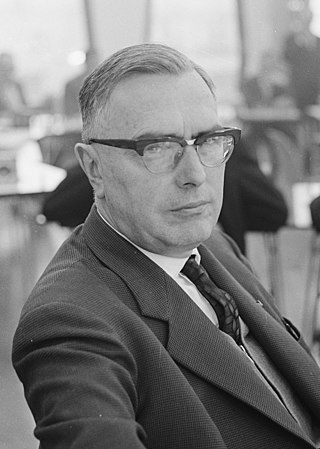
Machgielis "Max" Euwe was a Dutch chess player, mathematician, author, and chess administrator. He was the fifth player to become World Chess Champion, a title he held from 1935 until 1937. He served as President of FIDE, the World Chess Federation, from 1970 to 1978.
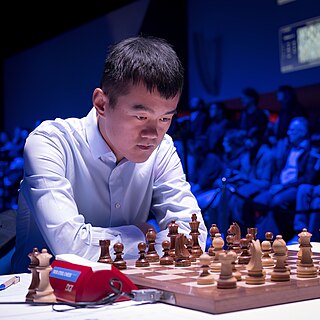
The World Chess Championship is played to determine the world champion in chess. The current world champion is Ding Liren, who defeated his opponent Ian Nepomniachtchi in the 2023 World Chess Championship. Magnus Carlsen, the previous world champion, had declined to defend his title.

José Raúl Capablanca y Graupera was a Cuban chess player who was world chess champion from 1921 to 1927. A chess prodigy, he is widely renowned for his exceptional endgame skill and speed of play.
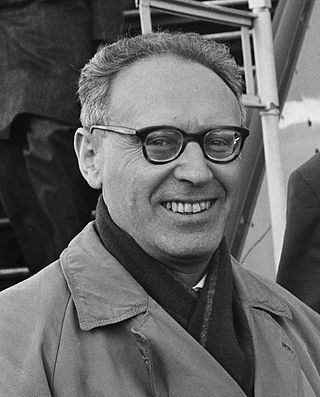
Mikhail Moiseyevich Botvinnik was a Soviet and Russian chess grandmaster who held five world titles in three different reigns. The sixth World Chess Champion, he also worked as an electrical engineer and computer scientist and was a pioneer in computer chess. He also had a mathematics degree (honorary).

Vasily Vasilyevich Smyslov was a Soviet and Russian chess grandmaster, who was World Chess Champion from 1957 to 1958. He was a Candidate for the World Chess Championship on eight occasions. Smyslov twice tied for first place at the USSR Chess Championships, and his total of 17 Chess Olympiad medals won is an all-time record. In five European Team Championships, Smyslov won ten gold medals.

Paul Keres was an Estonian chess grandmaster and chess writer. He was among the world's top players from the mid-1930s to the mid-1960s, and narrowly missed a chance at a World Chess Championship match on five occasions. As Estonia was repeatedly invaded and occupied during World War II, Keres was forced by the circumstances to represent the former Soviet Union and Nazi Germany (1941–44) in international tournaments.
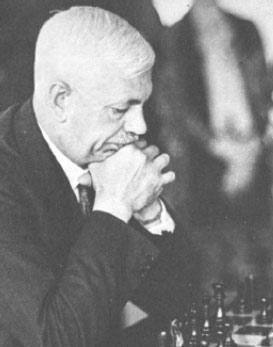
Sir George Alan Thomas, 7th Baronet was a British badminton, tennis and chess player. He was twice British chess champion and a 21-time All-England badminton champion. He also reached the quarterfinals of the singles and the semifinals of the men's tennis doubles at Wimbledon in 1911. Badminton's world men's team championships cup, equivalent to tennis' Davis Cup, is named Thomas Cup after him. Thomas lived most of his life in London and Godalming. He never married, so the hereditary Thomas baronetcy ended on his death.

Reuben C. Fine was an American chess player, psychologist, university professor, and author of many books on both chess and psychology. He was one of the strongest chess players in the world from the mid-1930s until his retirement from chess in 1951. He was granted the title of International Grandmaster by FIDE in 1950, when titles were introduced.
This is a timeline of chess.

Salomon Mikhailovich Flohr was a Czechoslovak and Soviet chess player and writer. He was among the first recipients of the title International Grandmaster from FIDE in 1950. Flohr dominated many tournaments of the pre-World War II years, and by the late 1930s was considered a contender for the World Championship. However, his patient, positional style was overtaken by the sharper, more tactical methods of the younger Soviet echelon after World War II.
The Candidates Tournament is a chess tournament organized by FIDE, chess's international governing body, since 1950, as the final contest to determine the challenger for the World Chess Championship. The winner of the Candidates earns the right to a match for the World Championship against the incumbent world champion.
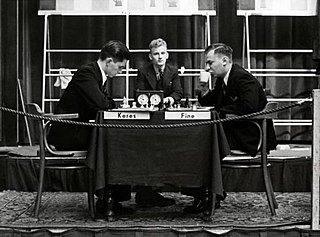
The AVRO tournament was a famous chess tournament held in the Netherlands in 1938, sponsored by the Dutch broadcasting company AVRO. The event was a double round-robin tournament between the eight strongest players in the world.
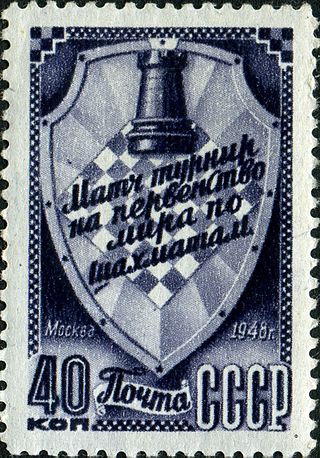
The 1948 World Chess Championship was a quintuple round-robin tournament played to determine the new World Chess Champion following the death of the previous champion Alexander Alekhine in 1946. The tournament marked the passing of control of the championship title to FIDE, the International Chess Federation which had been formed in 1924. Mikhail Botvinnik won the five-player championship tournament, beginning the era of Soviet domination of international chess that would last over twenty years without interruption.
The Hastings International Chess Congress is an annual chess tournament which takes place in Hastings, England, around the turn of the year. The main event is the Hastings Premier tournament, which was traditionally a 10 to 16 player round-robin tournament. In 2004/05 the tournament was played in the knock out format; while in 2005/06 and 2006/07 it was played using the Swiss system. Alongside the main event there is the challengers section, which is open to all players. The winner of the challengers event earns an invitation in the following year's Premier.

Groningen 1946 was the first major international chess tournament to be held after World War II. Held at Groningen in August and September 1946, it was considered a miracle that the Netherlands could stage such an event just fifteen months after the end of the war.

The 1937 World Chess Championship was played between Max Euwe and Alexander Alekhine in the Netherlands from October 5 to December 4, 1937. Alekhine regained his title in a rematch of the 1935 championship match.
The main organiser of Salzburg 1942, Ehrhardt Post, the Chief Executive of Nazi Grossdeutscher Schachbund, intended to bring together the six strongest players of Germany, the occupied and neutral European countries; world champion Alexander Alekhine, former champion Max Euwe, challenger Paul Keres, former challenger Efim Bogoljubov, winner of European tournament at Munich 1941 Gösta Stoltz, and German champion Paul Felix Schmidt. Euwe withdrew due to "illness". Actually, Euwe refused to participate because Alekhine was invited. His place was occupied by German sub-champion, the eighteen-years-old Klaus Junge. They made Salzburg 1942 the world's second, after a tournament purporting to be the first European Championship (Europameisterschaft) in Munich, strongest tournament in 1942.
References
- 1 2 3 Winter, E. (2003–2004). "Interregnum". Chess History Center.
- ↑ Münninghoff, A. (2001). Max Euwe: The Biography. New in Chess. ISBN 978-1-58863-002-5. Review and summary at McKim, D.K. (2006). "Max Euwe: The Biography". Jeremy Silman. and "BCM Chess Book Reviews : July 2001". British Chess Magazine. July 2001. Archived from the original on 2008-01-17.
- ↑ "World Championship Tournament 1948". chessgames.com.